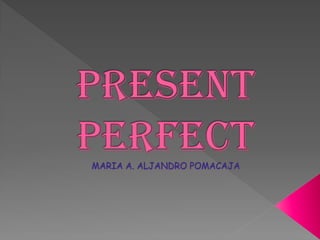A present perfect
- 2.  FOR ACTIONS WHICH HAPPENED AT AN UNSPECIFIED TIME IN THE PAST. THE EXACT TIME IS NOT MENTIONED BECAUSE IT ISN’T IMPORTANT Examples: Jeremy has bought a new car. (no mencionamos el Tiempo exacto porque no Es importante
- 3.  For actions which started in the past and are still going on in the present. Example: She has been a nurse since 1990 (ella comenzo a trabajar Como enfermera en 1990, y todavía es una enfermera hoy  For actions which have recently finished and their results are visible in the present.
- 4. Example: He has eaten too much. (como resultado, que ahora tiene un malestar estomacal).  With today , this morning/afternoon, etc,when these periods of time are not over at the time of speaking. Example: He has made ten cakes this morning (sigue siendo la mañana, por lo que este período de tiempo no ha terminado
- 5. LONG FORM SHORT FORM I I ‘VE HAVE WORKED YOU YOU WORKED HE HE HAS ‘S SHE SHE WORKED WORKED IT IT WE WE HAVE ‘VE YOU WORKED YOU WORKED THEY THEY
- 6. LONG FORM SHORT FORM I I HAVE NOT HAVEN’T YOU WORKED YOU WORKED HE HE SHE HAS NOT SHE HASN’T WORKED WORKED IT IT WE WE YOU HAVE NOT YOU HAVEN’T WORKED WORKED THEY THEY
- 7. INTERROGATIVE FORM SHORT ANSWERS I HAVE YES, I/YOU HAVE YOU WORKED…? NO,I/YOU HAVEN’T. HE HAS SHE WORKED…? YES, HE,SHE,IT HAS IT NO,HE/SHE/IT HASN’T WE YES,WE/YOU/THEY HAVE YOU HAVE WORKED…? NO,WE/YOU/THEY THEY HAVEN’T
- 8. Para los verbos regulares, el participio pasado se forma tomando el propio verbo y agregando "ed", o "d“ si termina en vocal. Si termina en "y", se cambia por "ied". EXAMPLES: We have played tennis for two hours. Hemos jugado tenis por dos horas. She has arrived late again. Ha llegado tarde de nuevo. You have studied a lot. Has estudiado mucho
- 9. WE FORM THE PAST EXAMPLES: PARTICIPE OF BASE FORM PAST PARTICIPE IRREGULAR VERBS be been DIFFERENTLY begin begun LOS VERBOS EN PAST catch caught PARTICIPE CAMBIAN Feel felt COMPLETAMENTE hear heard
- 10. fin










